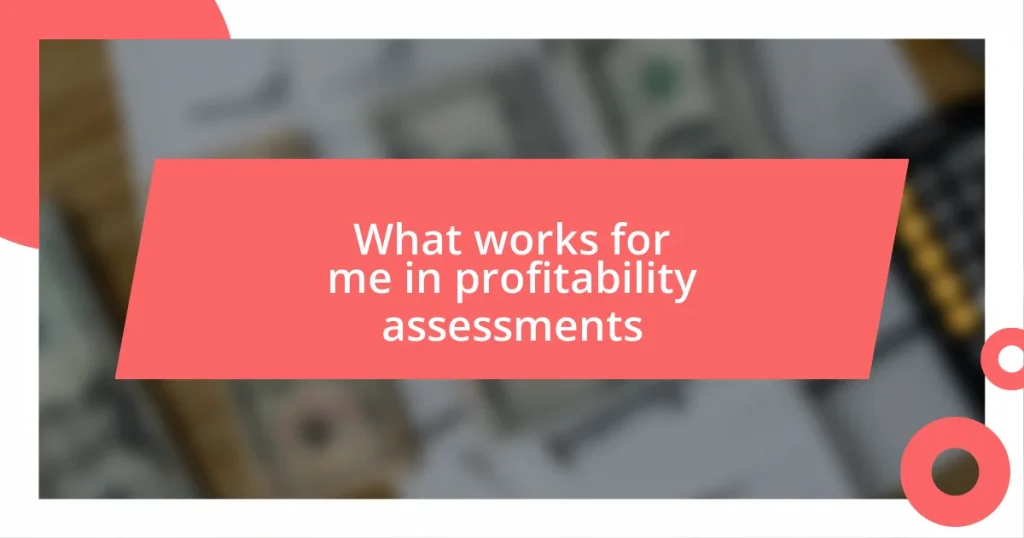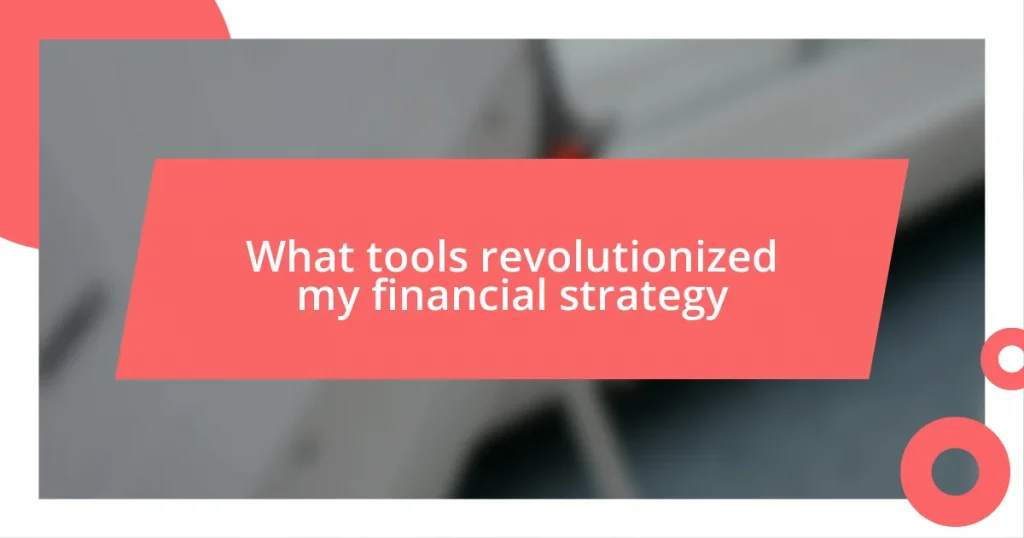Key takeaways:
- Focus on comprehensive financial metrics like savings rate and net worth, rather than just bank balance, to assess overall financial health.
- Set SMART financial goals—Specific, Measurable, Achievable, Relevant, Time-bound—to create a clear roadmap and enhance accountability.
- Regularly review and celebrate financial milestones to maintain motivation and reinforce commitment to financial growth.
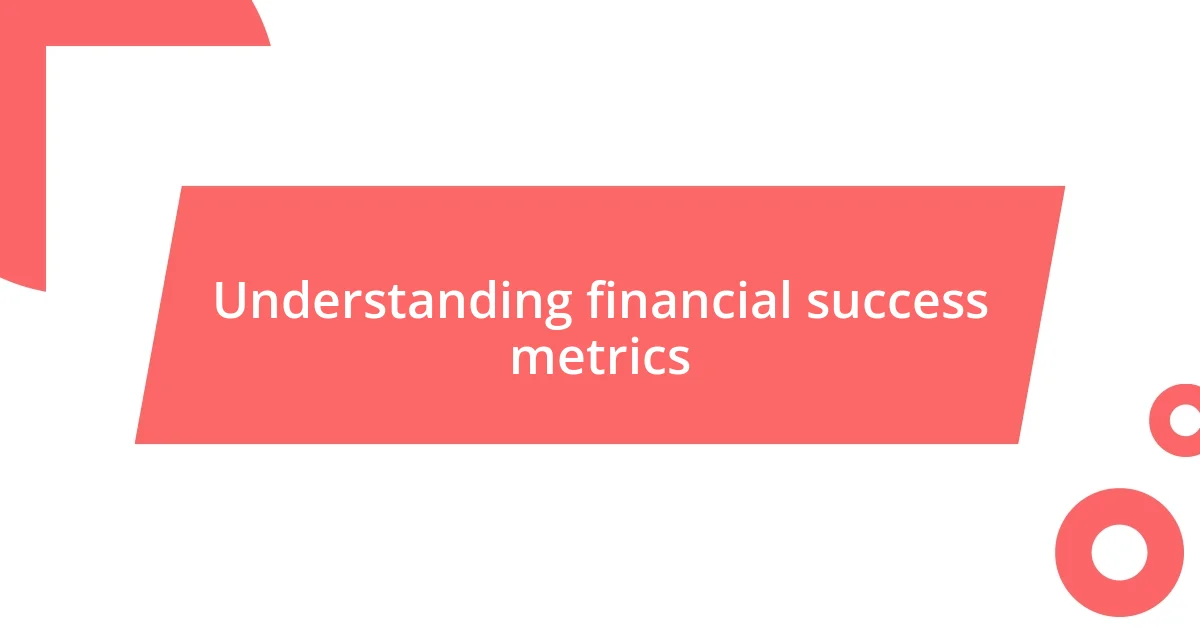
Understanding financial success metrics
When I first started tracking my financial success, I didn’t grasp how vital it was to focus on the right metrics. Initially, I looked at just my bank balance, thinking that was the bottom line. But what I realized over time is that metrics like net worth, savings rate, and debt-to-income ratio offer a more comprehensive view of my financial health. Have you considered what metrics matter most for your goals?
One core metric that can shape your financial journey is the savings rate. I remember the first time I calculated mine—it opened my eyes to how much I was actually saving compared to my income. I began to see how adjusting my spending habits could lead to a more secure financial future. I often wonder, how much clarity would you gain from tracking your savings rate consistently?
Then there’s net worth, which I find particularly illuminating. It’s not just about what sits in your bank account; it’s a snapshot of your total assets minus liabilities. I’ve had moments when a slight increase in my net worth brought a rush of motivation, reminding me that my financial journey is moving in the right direction. How does knowing your net worth make you feel about your financial progress? Understanding these metrics is a crucial step toward crafting a successful financial narrative.

Setting clear financial goals
Setting financial goals is the first step towards achieving lasting financial success. When I set my own goals, I chose short-term, medium-term, and long-term objectives to provide a clear roadmap. For instance, saving for a vacation was a short-term goal that motivated me to cut back on impulse purchases. The gratification I felt after reaching that goal sparked a deeper commitment to my financial journey.
In my experience, clarity is essential when setting these goals. I remember writing down my long-term goal of buying a home; it helped me visualize my future and made the savings feel more purposeful. I often refer back to that initial list of goals—it serves as a constant reminder of why I started. Have you ever found yourself reflecting on your goals and feeling that spark of excitement? Writing them down truly made a difference for me.
Lastly, it’s crucial to set SMART goals—Specific, Measurable, Achievable, Relevant, and Time-bound. I learned this concept during a financial workshop, and it transformed how I approach my objectives. Instead of vaguely saying I wanted to save money, I began to define how much I needed and by when. This approach gave me not just direction, but also a sense of accountability. How often do you check in on your financial goals to ensure you remain on track?
| Goal Type | Description |
|---|---|
| Short-term | Goals that can be achieved within a year, like saving for a vacation or paying off a small debt. |
| Medium-term | Goals that typically take one to five years, such as building an emergency fund or purchasing a car. |
| Long-term | Goals that span five years or more, like saving for retirement or buying a home. |
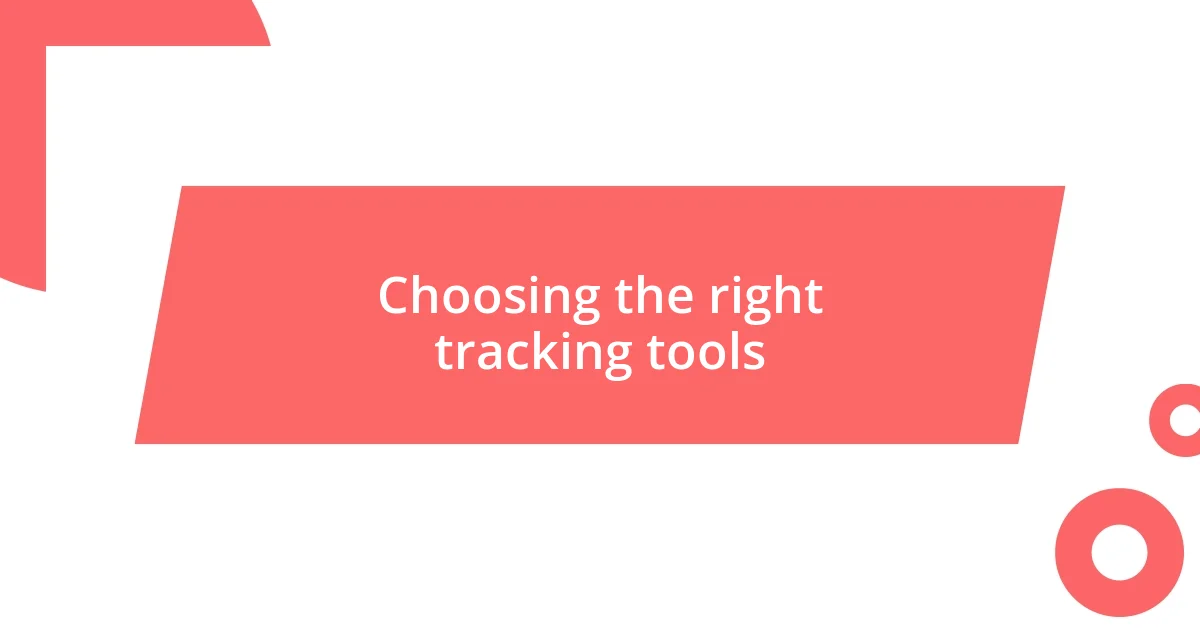
Choosing the right tracking tools
Choosing the right tracking tools can genuinely elevate your understanding of financial performance. I recall my early days of managing finances with just a simple spreadsheet. While it provided some clarity, it soon became overwhelming and lacked key features like visualization. That was when I switched to more specialized budgeting software, which transformed how I observed my spending habits. Tools that offer user-friendly interfaces and insightful dashboards can make tracking your financial journey not just effective but also enjoyable.
To help you decide on the best tools for your needs, consider the following factors:
- Functionality: Does the tool provide features like budgeting, net worth tracking, and expense categorization?
- User Experience: Is the interface intuitive enough that you can easily navigate it without feeling frustrated?
- Integration: Can it connect with your bank accounts and investment platforms for real-time data updates?
- Accessibility: Is it available as a mobile app, allowing you to track finances on the go?
- Price: Does it fit within your budget—are you looking for free options, or are you willing to invest in premium features?
Choosing the right tools can significantly impact how effectively you manage your finances, making it a decision worth thoughtful consideration.
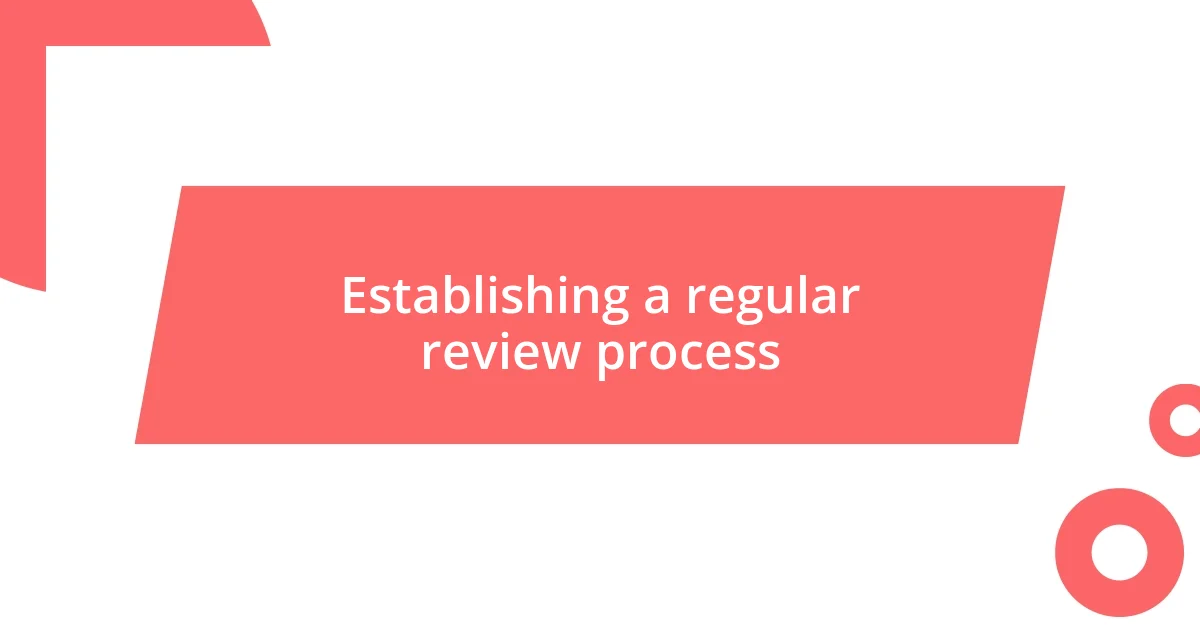
Establishing a regular review process
Establishing a regular review process is key to staying on track with your financial goals. I personally set aside time each month to evaluate my progress, which not only helps me assess my spending but also renews my motivation. Have you ever felt like you were drifting away from your goals? Dedicating time to review really grounds you, reminding you of your purpose and what you want to achieve.
During my reviews, I often create a simple checklist to guide my analysis. This way, I can reflect on what worked, what didn’t, and where adjustments are necessary. It’s fascinating how just a few moments of reflection can illuminate patterns I might have missed. This process isn’t just about numbers for me; it’s an emotional journey that reinforces my commitment to financial success.
Sometimes, I invite a friend to join me in these reviews for added accountability. Sharing insights and discussing goals can stir up new ideas, and it’s comforting to know that someone else is on a similar path. How often do you engage in discussions about your financial progress? I’ve found that these conversations not only enhance my understanding but also create a supportive space for financial growth.
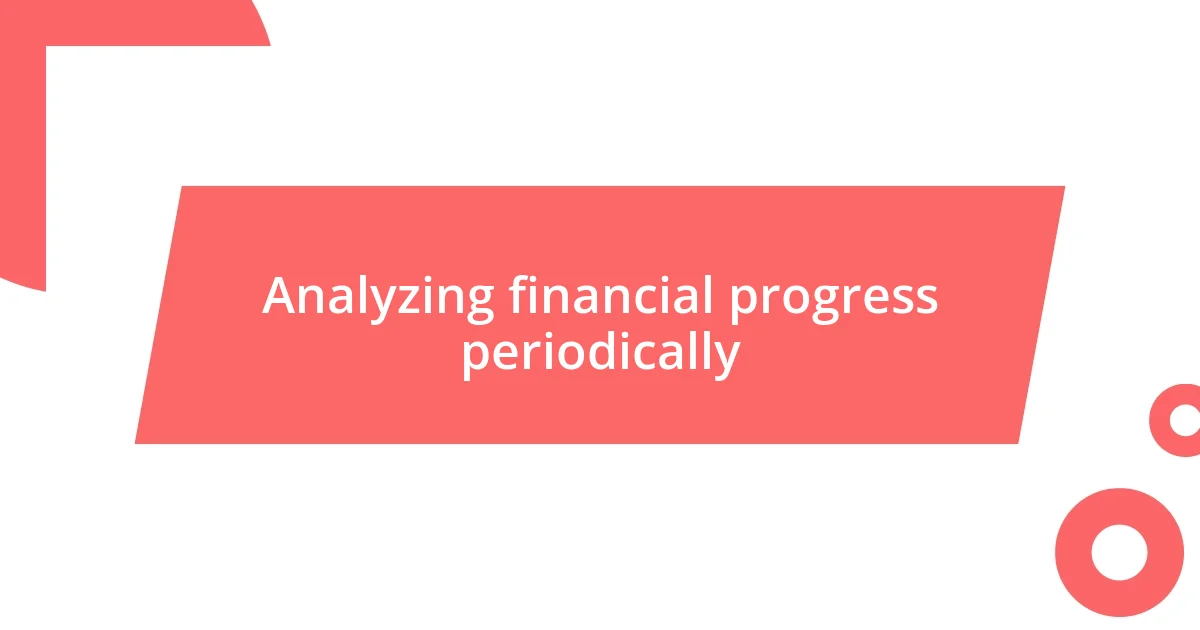
Analyzing financial progress periodically
Analyzing financial progress periodically is more than just a numbers game; it’s an opportunity to connect deeply with my aspirations. I often find that sitting down to scrutinize my financial data brings so much clarity. For instance, I once uncovered an unintended subscription that was silently draining my budget month after month. Realizing this not only saved me money but also reinforced how crucial it is to look closely at my spending habits.
In my experience, I like to establish a routine for these analyses, treating them almost like personal check-ins. I’ll grab my favorite cup of coffee, open up my tracking tool, and reflect on my financial journey over the past quarter. Have you ever noticed how trends can shift unexpectedly? For me, spotting a dip in savings prompted a reassessment of my discretionary spending, which ultimately led to significant lifestyle changes that bolstered my financial health.
Another essential aspect of analyzing my progress is benchmarking against my goals. I remember feeling a surge of pride when I hit my savings target a few years back, but I also felt the urge to stretch myself further. Are you setting challenges for yourself as part of your financial analysis? By adjusting my benchmarks, I keep my journey dynamic and inspiring, allowing room for growth and learning as I navigate the complexities of financial success.
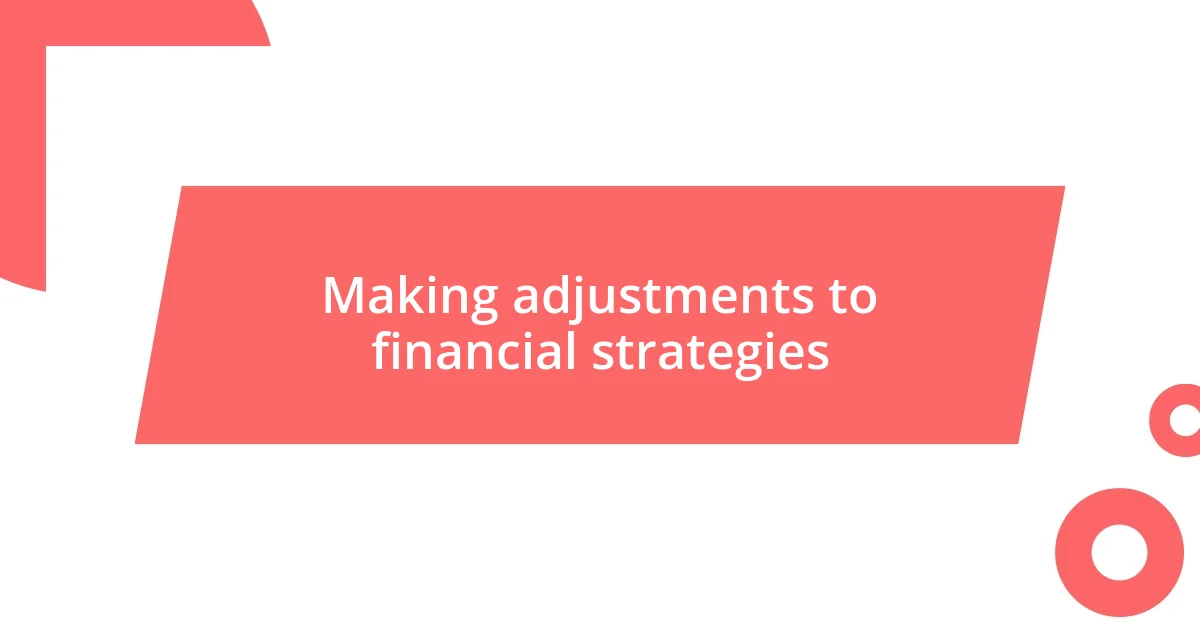
Making adjustments to financial strategies
Making adjustments to my financial strategies often comes down to a simple realization: flexibility is key. I remember a time when I was doggedly sticking to a budget plan that no longer reflected my lifestyle. After a few months of struggle, I asked myself, “Why am I forcing a square peg into a round hole?” Switching gears to a more adaptable approach was liberating; it allowed me to embrace changes in income and expenses without feeling guilty.
As I assess my financial landscape, I often identify patterns that prompt necessary tweaks. For instance, last year, I noticed my monthly grocery bill creeping up, which had me scratching my head. This led me to experiment with meal planning and bulk buying. Have you ever tried changing small habits to see bigger outcomes? By making subtle adjustments, I not only saved money but also discovered new recipes along the way, transforming my kitchen experience.
Engaging in conversations about my financial strategies with others has also been a game changer. I vividly recall a late-night chat with a friend who shared their investment journey, which sparked an idea for diversifying my own portfolio. Have you ever found inspiration in unexpected places? It’s fascinating how sharing our stories can lead to innovative changes. Each discussion provides fresh perspectives, fueling my motivation to keep refining my approach while staying aligned with my evolving goals.
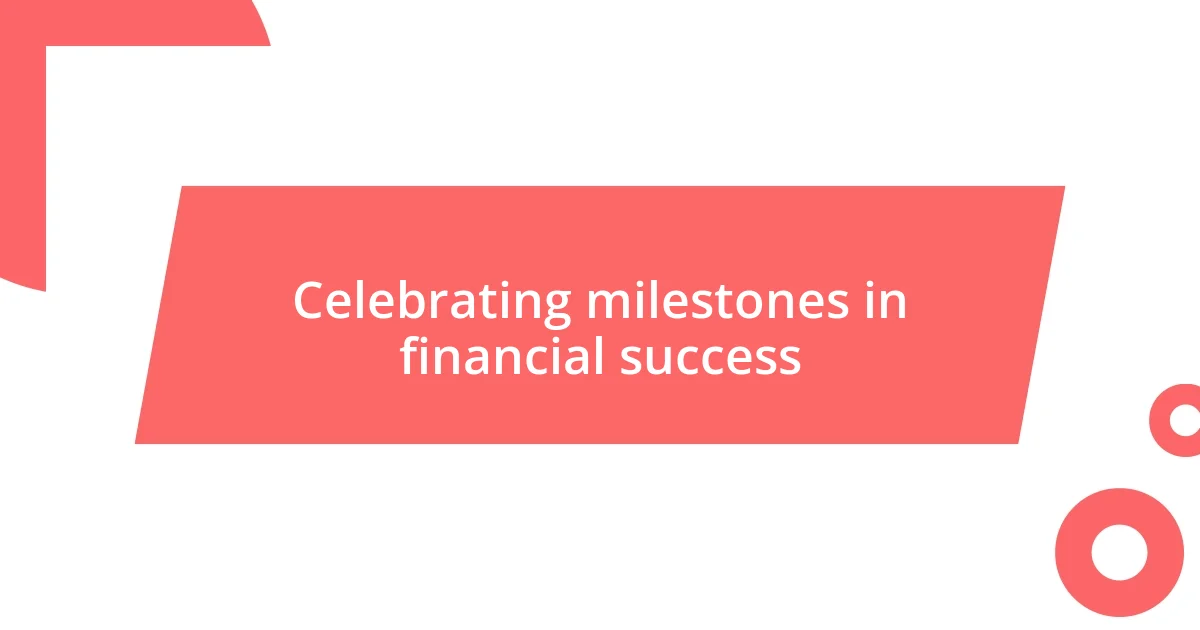
Celebrating milestones in financial success
Celebrating milestones in financial success is something I truly cherish. Just last year, I reached a personal savings goal that felt monumental. I remember treating myself to a nice dinner—nothing extravagant, but it was a moment to acknowledge my hard work. Have you ever paused to recognize how far you’ve come? These small celebrations help me stay motivated for my next target.
When I hit a significant milestone, like paying off credit card debt, I often reflect on the journey that got me there. The relief washed over me, reminding me of the discipline and sacrifices involved. As I savored that moment, I felt inspired to set even bigger goals. It’s amazing how celebrating those victories, no matter their size, fuels my ambition. Have you discovered the power of reflection in your financial journey?
Additionally, I’ve found that sharing my milestones with friends and family amplifies the joy. I once hosted a small gathering to celebrate reaching my investment goal, and it turned into a meaningful conversation about financial literacy. Have you considered how sharing your success can encourage others? Each success story builds a community of support, reinforcing the idea that we’re all in this together. Celebrating milestones isn’t just about me—it’s about creating a shared experience that inspires growth in everyone involved.













